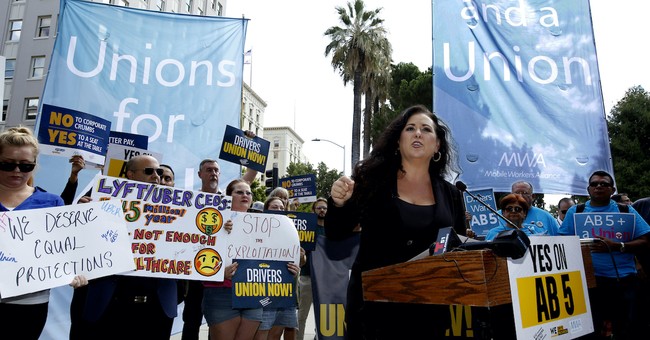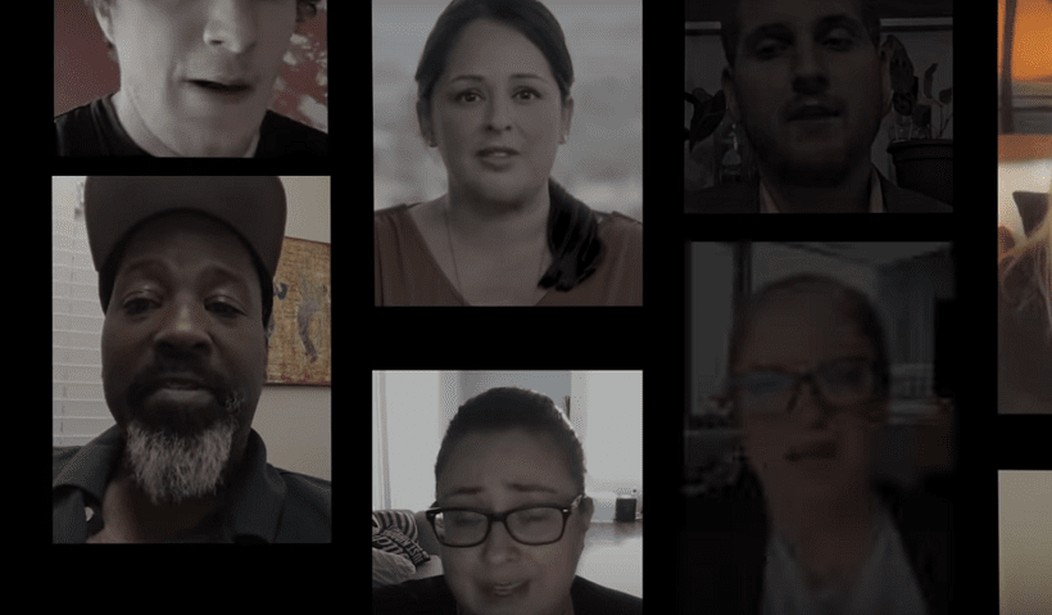
For small business owners and freelancers in California, AB5 has been THE major topic of 2020, starting even back in December 2019. The law forbidding freelancing and gig work entered the mainstream public’s radar in August, when Uber and Lyft nearly pulled out of the state over it (they’re only still operating because a judge issued an injunction preventing immediate enforcement of AB5), and the California Business and Industrial Alliance (CABIA) is hoping to bring awareness of the insanity to a nationwide audience with a new ad scheduled to run during the Presidential Debate.
"AB5 is a California law that made it illegal for countless freelancers to earn a living."
Catch CABIA's *new* Freelancers Fight Back ad today on Fox News nationally, and on both Fox and CNN in local markets during the debate. https://t.co/e9jXvzlLbq pic.twitter.com/Eg8N0tA01i
— @cabia (@cabia_speakup) September 29, 2020
In addition to being shown throughout the day on Fox News, the spot will air in California markets on Fox and CNN during the debate. Since many in California’s mainstream press still buy the union line about AB5, and coronavirus shutdowns have kept ordinary Californians from feeling the full impact of AB5’s terribleness (for example, there were no pools open this summer, no concerts or music festivals, no sports camps, no “theater in the park” type of events – all of which rely on independent contractor labor), the association had to find a way to cut through the noise and reach ordinary Californians who’ll be voting in a few weeks and will have the opportunity to vote against politicians who championed or voted for the law.
In a press release, a CABIA spokesperson said:
Since AB 5’s passage, countless California freelancers have watched their incomes plummet. Freelancers Against AB 5, a Facebook group started by Southern California freelancer Karen Anderson (who appears in the ad) has grown to more than 19,000 members — many of whom have lost their livelihoods as a consequence of the law.
Below is just a small sampling of what freelancers had to say about AB 5:
“AB 5 destroyed my life.”
“It [AB 5] killed half of my income.”
“It [AB 5] basically upended my entire business model.”
Here’s the full spot:
The spot shows snippets of stories from numerous AB5 victims whose full submissions are listed on the Freelancers Fight Back website, which is run by CABIA. Jennifer Oliver O’Connell is a freelance writer and yoga instructor in Southern California who’s seen both of her incomes impacted by the law. As “payback” for investigating how the bill came to be and speaking out for its repeal, O’Connell (along with this writer and RedState’s Kira Davis) has been falsely accused by the bill’s author, Asm. Lorena Gonzalez-Fletcher (D-City Heights) of being paid by Uber, Lyft, and others for her work.
Instead of being cowed, and to be on record as actually having been impacted by AB5 (since a CNET hit piece written about AB5 critics simply says she “claims” she was impacted by the bill), O’Connell submitted her AB5 story in response to CABIA’s open call. In addition, O’Connell told RedState:
I wanted to contribute my voice to the subject of AB5, that it is still doing damage to writers and those who have incorporated, and its need for repeal. Minorities and small business owners have been disproportionately affected by AB5; it is simply a new form of government chains used to silence diversity and economic progress.
At its inception in 2017, CABIA fought against Private Attorney General Act (PAGA) actions, not AB5, which wasn’t a law yet. If you thought AB5 was one of the worst laws to come out of California, think again. CABIA’s website explains the disturbing PAGA law, whose premise is that the Attorney General can’t possibly be everywhere at once so private attorneys should have the ability to be “deputized,” as it were:
The California Business and Industrial Alliance (CABIA) is a trade organization founded in 2017 by business executives and entrepreneurs to fix California’s worst law: the Private Attorneys General Act (PAGA).
More than 35,000 PAGA complaints have been filed against employers since 2004. The problem has grown worse in recent years: In 2016, more than 5,000 PAGA complaints were filed – an astonishing 1,440 percent increase from the law’s first year in effect.
The Alliance is led by a team of experienced California business owners and communicators committed to creating a regulatory climate that fosters the creation of new businesses and helps existing ones prosper.
The insidiousness of PAGA actions is captured well in this video.
This is one area of law that’s even more lucrative than chasing ambulances – yes, I know some Plaintiffs attorneys are talented and ethical and necessary, but then you have clowns like this:
What's wrong with PAGA?
Look at this outrageous $675k settlement.
*$630k–93% of the money–went straight into the pockets of @Lawyersforjust.
*Just $10k went to the lead employee on the complaint, and a measly $33 was paid to the other employees.https://t.co/mPucBH69ZY
— @cabia (@cabia_speakup) August 26, 2020
Once AB5 was signed into law many of CABIA’s members were hammered by that, too.
Houman Salem, an Iranian immigrant who runs a fashion design/manufacturing business in an economically disadvantaged area of Los Angeles County, was one of the co-founders of CABIA but had to step back when his company was one of those hit with a PAGA Action. He tells RedState:
The PAGA lawsuit against my company, Argyle Haus, was based on the fact that we allowed our employees to have flexibility and control their own lunch breaks. Some would clock in after 28 or 29 minutes instead of after 30, and in a PAGA attorney’s mind that somehow translated into the employees being robbed of their break altogether, prompting the lawsuit.
I’ve since had to take control of lunch break away from employees, decreasing their level of autonomy and basically turning them into robots to make sure they take 30 minutes and EXACTLY 30 minutes. PAGA basically punishes both businesses and workers and helps neither.
Isn’t it interesting how everything these lawmakers touch results in economic harm to minorities, a lack of worker flexibility, and serves to dissuade ambition?
Anyway, For many small business owners, being faced with AB5 and a PAGA action on top of dealing with California’s already onerous taxation and regulation structure would be the last straw. For Salem, though, it was a different kind of last straw: He decided to run for the California State Senate in 2020 to bring awareness of just how backward all of the state’s business laws and regulations are and to hopefully change them.
Once AB5 was passed and signed into law in late 2019, that too affected Salem’s business. He says:
“AB5 has been a complete disaster for small businesses, and especially for me in the fashion industry. Typically we would have several designers who concentrated on different categories of design and would hire them as freelancers, as needed, per project. However, that opportunity for them to make money and for me to have a revenue stream has been eliminated by the state of California. So on the one hand the state makes it difficult for businesses with respect to regulations and taxes, and on the other it takes away revenue opportunities.”
Yes, because what California needs is FEWER domestic garment manufacturers. (Yes, that was sarcasm.)
Both of these laws have to go, according to Tom Manzo, founder and president of CABIA. Businesses are afraid to use independent contractors even if in some fields they’re now seemingly allowed by the “clean-up” bill, AB 2257, because all it takes is one disgruntled “contractor” initiating a PAGA action (which essentially becomes a class action lawsuit without having to go through the same steps of certification) or an EDD audit, and then the business owner is potentially on the hook for hundreds of thousands of dollars. Manzo said in a press release:
“Laws like AB 5 and the Private Attorneys General Act are a disgrace to our great state. Everyone involved in sustaining these awful laws — the trial lawyers, the unions, the bought politicians — should be ashamed. California’s disastrous experience should be a warning to any politician who wants to expand these ideas nationwide.”
CABIA has been fighting back against AB5 all year in many ways, one of which is by taking out full-page ads in print newspapers. One shamed Gonzalez-Fletcher after she tweeted, “F**k Elon Musk”:
You hit the nail on the head in @sdut @cabia_speakup ! As if life weren't bad enough in CA @LorenaAD80 @LorenaSGonzalez just keeps making it worse; all just to feed her own ego & promote her next political run. She's calling YOU "big business" but she hates business of all sizes. pic.twitter.com/Exx8j03TKF
— Lisa Rothstein – Lollipop Guild Warrior #RepealAB5 (@davincidiva) May 12, 2020
And another called Gonzalez-Fletcher and two of her allies in the legislature bullies when they teamed up to kill AB5 fixes proposed by a Republican:
On the day #AB5 fix bills going up in committee, business group took out this full-page ad targeting author @LorenaSGonzalez, @CaliforniaLabor head @ArtPulaski and @SenHannahBeth pic.twitter.com/s5XEsdR1nM
— Jeremy B. White (@JeremyBWhite) May 20, 2020
Now that the PRO Act, which takes AB5 national and has the added bonus (/sarc) of claiming to invalidate state-based right-to-work laws, has passed the Senate and Joe Biden has promised to sign it if elected, CABIA wants to be sure that voters around the country understand that the freedom to put food on one’s table and a roof over one’s head is in grave jeopardy this election.
Both Joe Biden and Kamala Harris have given full-throated support to AB5. California has led the nation in some really dumb ideas in the past (and some of our readers never let me forget it). But there are sane business owners and employees/contractors who like to “hustle” and be in control of their own level of income here in this state, and their freedom to do so has been nearly extinguished. These voices are the warning. It’s not just California. Ignore the state and laugh at your own peril.
(Disclaimer: Houman Salem and Jennifer Oliver O’Connell are both friends of the author.)















Join the conversation as a VIP Member